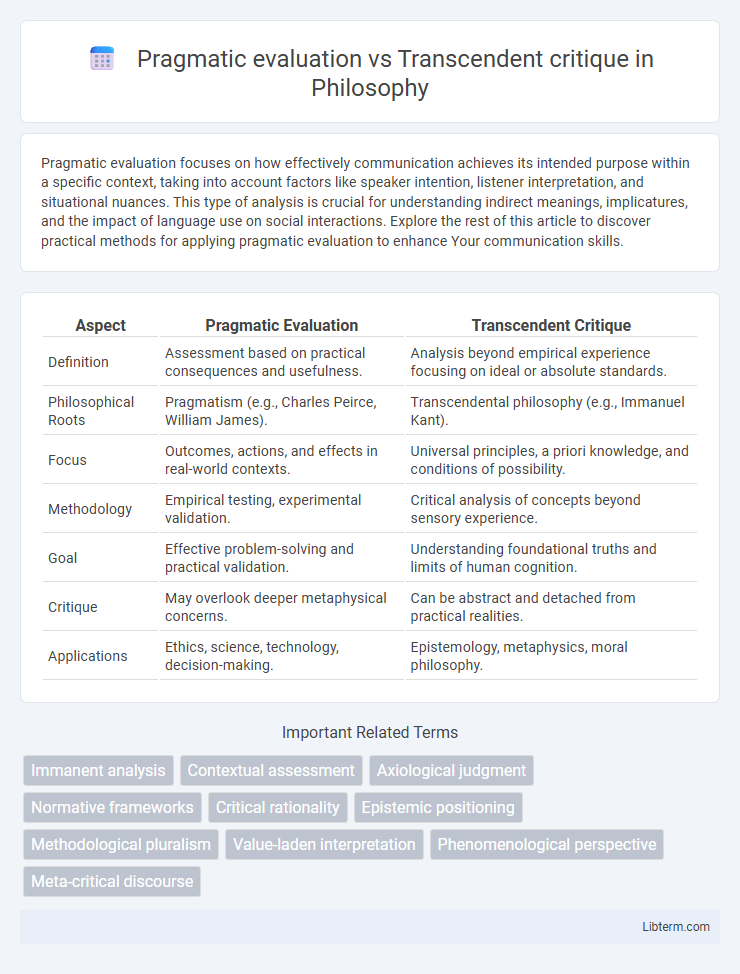Pragmatic evaluation focuses on how effectively communication achieves its intended purpose within a specific context, taking into account factors like speaker intention, listener interpretation, and situational nuances. This type of analysis is crucial for understanding indirect meanings, implicatures, and the impact of language use on social interactions. Explore the rest of this article to discover practical methods for applying pragmatic evaluation to enhance Your communication skills.
Table of Comparison
| Aspect | Pragmatic Evaluation | Transcendent Critique |
|---|---|---|
| Definition | Assessment based on practical consequences and usefulness. | Analysis beyond empirical experience focusing on ideal or absolute standards. |
| Philosophical Roots | Pragmatism (e.g., Charles Peirce, William James). | Transcendental philosophy (e.g., Immanuel Kant). |
| Focus | Outcomes, actions, and effects in real-world contexts. | Universal principles, a priori knowledge, and conditions of possibility. |
| Methodology | Empirical testing, experimental validation. | Critical analysis of concepts beyond sensory experience. |
| Goal | Effective problem-solving and practical validation. | Understanding foundational truths and limits of human cognition. |
| Critique | May overlook deeper metaphysical concerns. | Can be abstract and detached from practical realities. |
| Applications | Ethics, science, technology, decision-making. | Epistemology, metaphysics, moral philosophy. |
Introduction to Pragmatic Evaluation and Transcendent Critique
Pragmatic evaluation centers on assessing ideas and actions based on their practical outcomes and real-world effectiveness, emphasizing tangible results and utility. Transcendent critique explores concepts through ideal standards and universal truths, prioritizing abstract principles and moral or aesthetic values beyond immediate practicality. Understanding these approaches allows for a balanced analysis that considers both functional impact and broader, normative implications.
Defining Pragmatic Evaluation
Pragmatic evaluation emphasizes practical applicability and measurable outcomes in assessing theories, focusing on real-world effectiveness rather than abstract ideals. It prioritizes empirical evidence, usability, and the impact of concepts in actual contexts, aligning evaluation criteria with observable consequences. This approach contrasts with transcendent critique, which seeks absolute, universal standards independent of practical considerations.
Unpacking Transcendent Critique
Transcendent critique explores abstract, universal principles to evaluate ideas beyond practical outcomes, emphasizing ideal standards of truth, ethics, and meaning. It contrasts with pragmatic evaluation, which focuses on concrete results and usefulness in real-world contexts. By unpacking transcendent critique, scholars address foundational assumptions and normative ideals that shape judgments across philosophical and cultural domains.
Core Principles of Pragmatism
Pragmatic evaluation centers on the core principles of pragmatism, emphasizing practical consequences, experiential learning, and problem-solving as criteria for truth and meaning. It prioritizes usefulness, adaptability, and action-oriented outcomes over abstract ideals, contrasting with transcendent critique, which seeks absolute, context-independent truths. This approach fosters continuous inquiry by valuing hypotheses tested through real-world impacts and improvements.
Key Tenets of Transcendence
Transcendent critique centers on the pursuit of universal and objective truths beyond empirical observations, emphasizing moral and metaphysical principles that guide evaluative judgments. It contrasts with pragmatic evaluation, which prioritizes practical outcomes and context-specific utility over absolute ideals. Key tenets of transcendence include adherence to enduring values, the quest for higher meaning, and the belief in intrinsic standards that surpass temporal and cultural contingencies.
Practical Applications: Pragmatic Approaches
Pragmatic evaluation emphasizes real-world applications and measurable outcomes, prioritizing actionable insights that directly impact policy, education, and technology. This approach integrates stakeholder feedback and adaptive methods to solve specific problems efficiently. Transcendent critique, in contrast, explores deeper ethical and philosophical implications, often less concerned with immediate usability or practical implementation.
Philosophical Foundations of Transcendent Critique
Transcendent critique, rooted in Kantian philosophy, emphasizes a priori principles to uncover universal conditions of knowledge and morality, contrasting with the empirical, outcome-focused nature of pragmatic evaluation. It interrogates the underlying structures of reason and experience, seeking objective truths beyond practical consequences. This approach critiques concepts by assessing their coherence with transcendental conditions rather than immediate applicability or success.
Comparative Analysis: Pragmatic vs Transcendent Perspectives
Pragmatic evaluation centers on practical outcomes and measurable effectiveness, emphasizing real-world applicability and functional success. Transcendent critique prioritizes ideal principles, moral values, and universal standards, seeking to assess works or ideas beyond mere utility. This comparative analysis highlights how pragmatic perspectives ground judgments in empirical results, whereas transcendent perspectives uphold abstract, often ethical, ideals as the highest evaluative criteria.
Strengths and Limitations of Each Approach
Pragmatic evaluation excels in measuring practical outcomes and real-world effectiveness by focusing on usability and tangible results, making it ideal for applied research and policy analysis; however, it can overlook deeper theoretical implications and broader conceptual frameworks. Transcendent critique offers profound insights into underlying ideologies and cultural contexts, promoting comprehensive understanding and critical reflection, though it may lack immediate applicability and measurable impact. Balancing both approaches enhances research robustness by combining empirical validation with critical theory, yet challenges arise when integrating practical data with abstract critical perspectives.
Choosing the Right Method: Contexts and Considerations
Choosing the right evaluation method depends on the goals and context of the analysis, where pragmatic evaluation prioritizes practical outcomes and actionable insights, while transcendent critique emphasizes deeper, philosophical understanding and ideal standards. Pragmatic evaluation is suited for applied research and policy-making contexts that require measurable impact and stakeholder relevance. Transcendent critique is more appropriate in theoretical discourses, critical theory, and contexts demanding normative judgments about values and ethics.
Pragmatic evaluation Infographic

 libterm.com
libterm.com